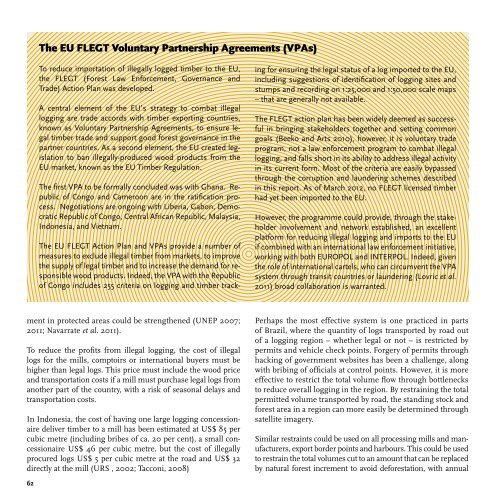Green Carbon, Black Trade - UNEP
Green Carbon, Black Trade - UNEP
Green Carbon, Black Trade - UNEP
Create successful ePaper yourself
Turn your PDF publications into a flip-book with our unique Google optimized e-Paper software.
The EU FLEGT Voluntary Partnership Agreements (VPAs)<br />
To reduce importation of illegally logged timber to the EU,<br />
the FLEGT (Forest Law Enforcement, Governance and<br />
<strong>Trade</strong>) Action Plan was developed.<br />
A central element of the EU’s strategy to combat illegal<br />
logging are trade accords with timber exporting countries,<br />
known as Voluntary Partnership Agreements, to ensure legal<br />
timber trade and support good forest governance in the<br />
partner countries. As a second element, the EU created legislation<br />
to ban illegally-produced wood products from the<br />
EU market, known as the EU Timber Regulation.<br />
The first VPA to be formally concluded was with Ghana. Republic<br />
of Congo and Cameroon are in the ratification process.<br />
Negotiations are ongoing with Liberia, Gabon, Democratic<br />
Republic of Congo, Central African Republic, Malaysia,<br />
Indonesia, and Vietnam.<br />
The EU FLEGT Action Plan and VPAs provide a number of<br />
measures to exclude illegal timber from markets, to improve<br />
the supply of legal timber and to increase the demand for responsible<br />
wood products. Indeed, the VPA with the Republic<br />
of Congo includes 255 criteria on logging and timber track-<br />
ing for ensuring the legal status of a log imported to the EU,<br />
including suggestions of identification of logging sites and<br />
stumps and recording on 1:25,000 and 1:50,000 scale maps<br />
– that are generally not available.<br />
The FLEGT action plan has been widely deemed as successful<br />
in bringing stakeholders together and setting common<br />
goals (Beeko and Arts 2010), however, it is voluntary trade<br />
program, not a law enforcement program to combat illegal<br />
logging, and falls short in its ability to address illegal activity<br />
in its current form. Most of the criteria are easily bypassed<br />
through the corruption and laundering schemes described<br />
in this report. As of March 2012, no FLEGT licensed timber<br />
had yet been imported to the EU.<br />
However, the programme could provide, through the stakeholder<br />
involvement and network established, an excellent<br />
platform for reducing illegal logging and imports to the EU<br />
if combined with an international law enforcement initiative,<br />
working with both EUROPOL and INTERPOL. Indeed, given<br />
the role of international cartels, who can circumvent the VPA<br />
system through transit countries or laundering (Lovric et al.<br />
2011) broad collaboration is warranted.<br />
ment in protected areas could be strengthened (<strong>UNEP</strong> 2007;<br />
2011; Navarrate et al. 2011).<br />
To reduce the profits from illegal logging, the cost of illegal<br />
logs for the mills, comptoirs or international buyers must be<br />
higher than legal logs. This price must include the wood price<br />
and transportation costs if a mill must purchase legal logs from<br />
another part of the country, with a risk of seasonal delays and<br />
transportation costs.<br />
In Indonesia, the cost of having one large logging concessionaire<br />
deliver timber to a mill has been estimated at US$ 85 per<br />
cubic metre (including bribes of ca. 20 per cent), a small concessionaire<br />
US$ 46 per cubic metre, but the cost of illegally<br />
procured logs US$ 5 per cubic metre at the road and US$ 32<br />
directly at the mill (URS , 2002; Tacconi, 2008)<br />
Perhaps the most effective system is one practiced in parts<br />
of Brazil, where the quantity of logs transported by road out<br />
of a logging region – whether legal or not – is restricted by<br />
permits and vehicle check points. Forgery of permits through<br />
hacking of government websites has been a challenge, along<br />
with bribing of officials at control points. However, it is more<br />
effective to restrict the total volume flow through bottlenecks<br />
to reduce overall logging in the region. By restraining the total<br />
permitted volume transported by road, the standing stock and<br />
forest area in a region can more easily be determined through<br />
satellite imagery.<br />
Similar restraints could be used on all processing mills and manufacturers,<br />
export border points and harbours. This could be used<br />
to restrain the total volumes cut to an amount that can be replaced<br />
by natural forest increment to avoid deforestation, with annual<br />
62
















